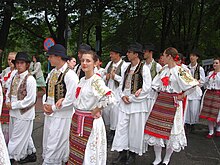
Back Култура на Унгария Bulgarian Cultura de Hungría Spanish فرهنگ در مجارستان Persian Unkarilainen kulttuuri Finnish Culture de la Hongrie French Kultura Mađarske Croatian Հունգարիայի մշակույթ Armenian Budaya Hungaria ID უნგრეთის კულტურა Georgian Kebudayaan Hungary Malay
This article needs additional citations for verification. (January 2011) |



| Part of a series on the |
| Culture of Hungary |
|---|
 |
| People |
| Languages |
| Mythology |
| Cuisine |
| Festivals |
| Religion |
| Art |
| Sport |
Hungarian culture is characterized by its distinctive cuisine, folk traditions, poetry, theatre, religious customs, music and traditional embroidered garments. Hungarian folklore traditions include tales, music, dance, decorated pottery, carvings and embroidery. Historically, Hungarian music has largely consisted of folk music and classical and baroque pieces.[1] Hungary shares cultural similarities with its neighbouring countries as well as with Turkic nations in Asia, the latter stemming from a history of interaction between Hungarians and Turkic peoples.[2][3][4][5][6][7] Noted Hungarian authors include Sándor Márai, Imre Kertész, Péter Esterházy, Magda Szabó and János Kodolányi. Imre Kertész is particularly noteworthy for having won the Nobel Prize in Literature in 2002.
- ^ "Hungary - Daily life and social customs". Britannica. Retrieved 2022-11-14.
- ^ Pető, Zoltán (2024-05-04). "The Hungarians and the Turkic Peoples: Relatives, Enemies, or Friends? | Hungarian Conservative". Hungarian Conservative. Retrieved 2024-06-08.
- ^ Sofuoglu, Murat. "Are Hungarians a Turkic nation?". Are Hungarians a Turkic nation?. Retrieved 2024-10-07.
- ^ Csáki, Éva (2021-12-02), "Similarities in Hungarian and Turkic Folk Literature: Folktales", Historical Linguistics and Philology of Central Asia, Brill, pp. 394–399, doi:10.1163/9789004499966_025, ISBN 978-90-04-49996-6, retrieved 2024-10-07
- ^ Fehér, Géza (1997). "Hungary's Relations with the Ottoman Empire" (PDF). Erdem Journal of Humanities and Social Science. 9 (27): 1063–1073.
- ^ "History of Hungary". Britannica. Retrieved 2024-10-07.
- ^ Egeresi, Zoltán (2021-11-19). "Hungary in the Organization of Turkic States: A Bridge between East and West". Anadolu Agency. Retrieved 2024-06-08.